Choosing AI Chatbot For eCommerce: How to Find the Best Solution for Your Platform
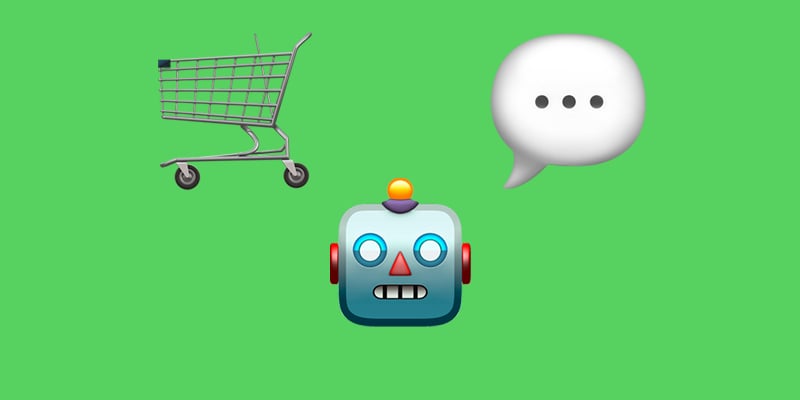
The ecommerce landscape is evolving rapidly, driven by the integration of cutting-edge technologies — and AI chatbots are no exception. In this guide, we delve into this emerging trend, navigating the complexities of artificial intelligence in ecommerce to provide a clear and insightful overview. It explores the transformative role of AI chatbots in ecommerce, detailing their advanced capabilities compared to traditional rule-based bots.
The article also features a breakdown of the best AI chatbots for popular platforms like Magento, Shopify, Shopware, and BigCommerce, offering insights into their features, integrations, and benefits. By the end, you’ll not only understand how AI chatbots are reshaping online retail but also discover their key benefits, empowering you to select the best AI chatbot for your ecommerce platform, regardless of the system you use.
With the growing demand for 24/7 support and personalized shopping journeys, AI-powered customer service is no longer a luxury — it’s a necessity. These intelligent systems allow online stores to manage high volumes of queries, offering everything from instant responses to tailored recommendations. From product discovery to post-purchase assistance, chatbots in ecommerce are redefining how businesses engage with buyers. By automating routine tasks and providing immediate, personalized interactions, the best AI chatbot for ecommerce ensures a seamless and efficient customer journey, setting the stage for increased satisfaction and higher conversion rates. Without further ado, let’s dive in.

Table of contents
What is an AI Chatbot?
An AI chatbot is a sophisticated digital tool designed to engage in human-like conversations, offering immediate assistance through text or voice. These chatbots operate at the intersection of natural language processing (NLP), machine learning, and, in some cases, deep learning, making them significantly more advanced than traditional rule-based bots. This blend of technologies allows AI chatbots to understand context, interpret nuances in language, and adapt their responses dynamically.
At their core, AI chatbots leverage NLP to process and analyze user input. This technology enables them to “understand” what a buyer is asking and respond in a way that feels natural and conversational. Combined with machine learning, chatbots can improve their performance over time, learning from interactions to refine their responses and better predict user intent. For businesses, this means a tool that evolves to meet customer needs more effectively with every use.
The functionality of AI chatbots in ecommerce extends far beyond simple Q&A. They assist with tasks such as product recommendations, order tracking, and troubleshooting. For example, a potential buyer browsing a store might ask an AI chatbot for advice on the best product for their needs. The chatbot can analyze the query and provide personalized suggestions, streamlining the decision-making process. This level of interaction enhances the shopping experience, turning casual browsers into loyal customers.
For ecommerce businesses, the potential of AI chatbots is transformative. These tools not only automate repetitive tasks but also provide a consistent and personalized user experience at scale. Whether it’s assisting with product searches or offering instant post-purchase support, AI chatbots for ecommerce businesses are becoming indispensable for improving customer satisfaction and boosting efficiency. Are they truly superior to rule-based chatbots? Let’s compare both side by side to find out.
AI Chatbots vs. Rule-Based Chatbots: What’s Best for eCommerce?
A key distinction between rule-based chatbots and AI-driven chatbots lies in their flexibility. Rule-based chatbots operate on predefined scripts, meaning they can only respond to specific prompts or commands. If a prospect asks something outside their programmed scope, the conversation halts.
AI-driven chatbots, on the other hand, thrive on adaptability. Using NLP and machine learning, they can handle unexpected queries, understand varying sentence structures, and even pick up on user sentiment to tailor their responses.
Here’s a table comparing AI chatbots with rule-based bots to highlight their key differences:
| Feature | AI Chatbots | Rule-Based Chatbots |
| Technology | Use AI technologies like NLP and machine learning to understand and adapt. | Operate based on predefined rules and scripts. |
| Flexibility | Highly flexible; can handle complex, unexpected queries. | Limited flexibility; can only respond to specific, pre-programmed inputs. |
| Learning Capability | Continuously learn and improve through user interactions. | No learning capability; responses remain static unless manually updated. |
| Response Quality | Dynamic and context-aware, providing more natural and human-like interactions. | Static and often rigid; unable to adapt to user context or intent. |
| Language Understanding | Understand nuanced language, synonyms, and varied sentence structures. | Require exact matches to trigger responses; limited language comprehension. |
| Personalization | Can tailor responses based on user behavior, preferences, and history. | Lack personalization; respond the same way to all users. |
| Use Cases | Ideal for complex tasks like customer support, lead generation, and upselling. | Best for simple FAQs or repetitive queries with clear patterns. |
| Integration | Easily integrates with various platforms and systems to access real-time data. | Limited integration capabilities; relies on static databases. |
| Scalability | Easily scalable for high-traffic environments. | Scalability is limited; struggles with high query volumes. |
| Implementation Time | Requires more time for training and setup but offers long-term benefits. | Quick to set up but less adaptable to growing business needs. |
| Cost | Higher initial cost but more cost-effective over time due to automation. | Lower initial cost but limited capabilities often require frequent updates. |
| Examples | AI-powered assistants like Drift, Intercom, and Tidio. | Simple bots like FAQ bots or ticketing system chatbots. |
This table offers a straightforward comparison to help you decide which type of chatbot aligns best with your needs. If you’re looking for a basic FAQ bot or a ticketing system chatbot, a rule-based solution may suffice. However, AI chatbots can also handle these tasks effectively while offering the added advantage of adaptability and advanced features. By choosing the latest AI technology, you can expand its use to other areas of your ecommerce website and take full advantage of cutting-edge customer support solutions.
Why an AI Chatbot is a Must-Have Tool for eCommerce
AI chatbots have become indispensable for ecommerce businesses, offering a range of benefits that address both operational challenges and customer expectations. Here’s why integrating an AI chatbot is essential for modern online stores:
- Cost Reduction Without Compromising Quality. AI chatbots allow businesses to automate support in ecommerce, reducing the need for large support teams. They handle repetitive tasks, such as answering FAQs or providing order updates, at a fraction of the cost of human agents. According to a study by Juniper Research, AI chatbots could save businesses over $8 billion annually by 2025, showcasing their cost-efficiency.
- Scalability and Simultaneous Query Handling. Unlike human agents who can assist only one customer at a time, AI service solutions manage multiple conversations simultaneously. Whether it’s peak shopping seasons or unexpected surges in traffic, an AI chatbot for ecommerce ensures every query is addressed promptly, minimizing wait times and improving user satisfaction.
- Improved Customer Service and Availability. AI chatbots operate 24/7, ensuring customers receive immediate responses regardless of time zones. This round-the-clock availability is crucial for ecommerce businesses catering to global audiences. Quick responses not only enhance customer satisfaction but also reduce cart abandonment rates, a critical factor for online retailers.
- Personalized Shopping Assistance. One of the most impactful AI chatbot benefits for businesses is their ability to provide personalized shopping experiences. By analyzing user behavior, preferences, and purchase history, chatbots can recommend products tailored to individual needs. For instance, a buyer searching for winter coats might receive curated options based on their style and budget, boosting conversion rates.
- Streamlined Checkout Processes. AI chatbots simplify the purchasing journey by guiding buyers through checkout steps, answering payment-related queries, and resolving potential issues in real time. This reduces friction in the buying process, leading to higher completion rates. Businesses using chatbots have reported up to a 20% improvement in checkout conversions.
- Customer Retention Through Post-Purchase Support. From tracking orders to handling returns, AI chatbots ensure buyers remain engaged even after a purchase. This seamless post-purchase experience strengthens customer loyalty and increases the likelihood of repeat business.
- Data-Driven Insights and Business Optimization. AI chatbots don’t just assist clients; they gather valuable data on user preferences, common queries, and pain points. This data can help businesses refine their offerings, optimize their marketing strategies, and improve overall operations.
- Proven Demand for AI-Driven Solutions. The adoption of AI customer service solutions in ecommerce is on the rise. Gartner predicts that by 2027, 25% of all customer interactions will involve AI, demonstrating its growing importance. Additionally, businesses offering AI-powered support have seen customer satisfaction rates improve by up to 60%.
As you can see, AI chatbots are no longer optional for ecommerce businesses — they are a necessity. By reducing costs, improving scalability, and providing personalized customer interactions, the best AI chatbot for ecommerce can transform how your business engages with your audience. As the demand for instant, intelligent support continues to grow, adopting AI chatbots is a strategic move that ensures both operational efficiency and exceptional buying experiences. Let’s see which tools lead the way for AI chatbots in ecommerce.
Cross-Platform AI Chatbot Solutions for eCommerce
Let’s start with cross-platform ecommerce chatbots. Such tools ensure that no matter where your business operates, your clients receive consistent support. These chatbots connect with your ecommerce backend, syncing inventory, customer data, and order histories to provide real-time assistance. This seamless integration allows managing customer interactions across multiple touchpoints efficiently, whether on a website, social media, or a messaging app.
Several AI chatbots have emerged as leaders in the realm of cross-platform ecommerce, offering robust features and wide compatibility:
- . Known for its conversational marketing capabilities, Drift excels in engaging potential buyers and driving conversions. Its AI-powered bots can qualify leads, schedule meetings, and answer queries, making it a top choice for businesses focusing on lead generation. Drift integrates smoothly with platforms like Shopify and Magento, offering a comprehensive chatbot solution for ecommerce.
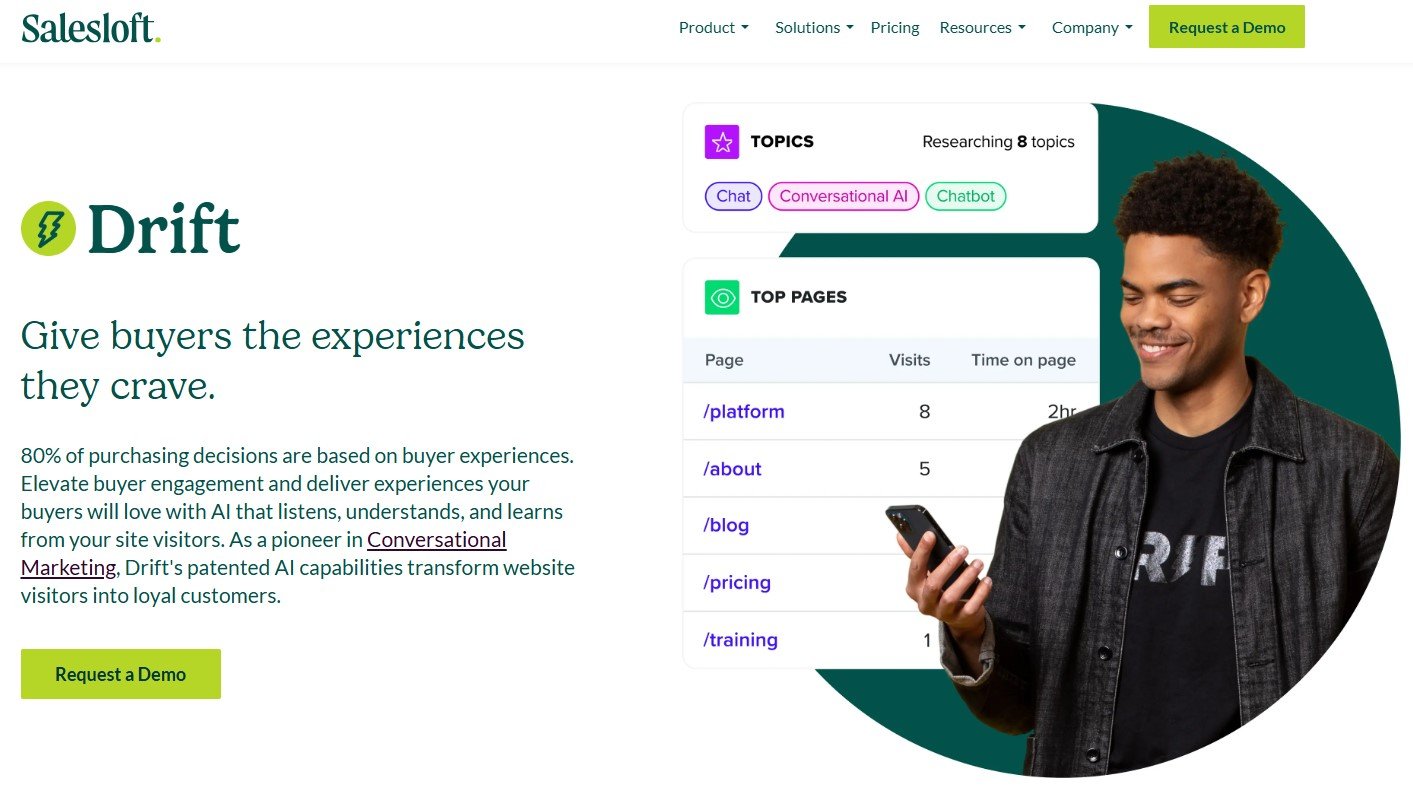
- . Tidio is a highly flexible chatbot solution designed for small to medium-sized businesses. It supports live chat, AI-powered responses, and email integration, ensuring that no query goes unanswered. Compatible with platforms like Shopify and BigCommerce, Tidio also provides pre-built templates for common ecommerce tasks like tracking orders or offering product recommendations.
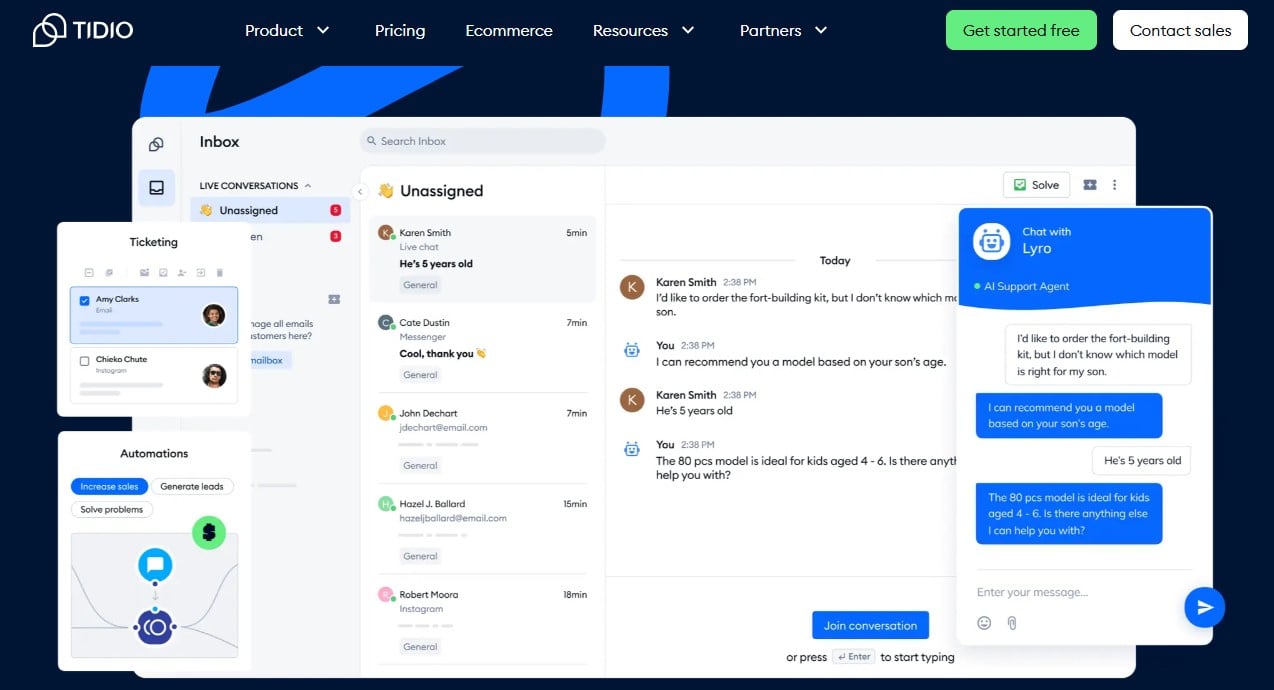
- . As a robust cross-platform ecommerce chatbot, Intercom specializes in customer engagement and support. Its AI features include personalized messaging, segmentation, and proactive support prompts. With integrations for platforms like Magento and BigCommerce, Intercom is ideal for businesses looking to streamline customer interactions at scale.

- . Chatfuel is a user-friendly platform that enables businesses to create AI-powered chatbots without coding expertise. It integrates effortlessly with platforms such as Shopify and WooCommerce, making it a versatile choice for ecommerce enterprises. Chatfuel’s capabilities include automating support, providing personalized product recommendations, and facilitating order tracking. Its analytics feature offers insights into customer interactions, allowing businesses to refine their strategies for enhanced engagement.
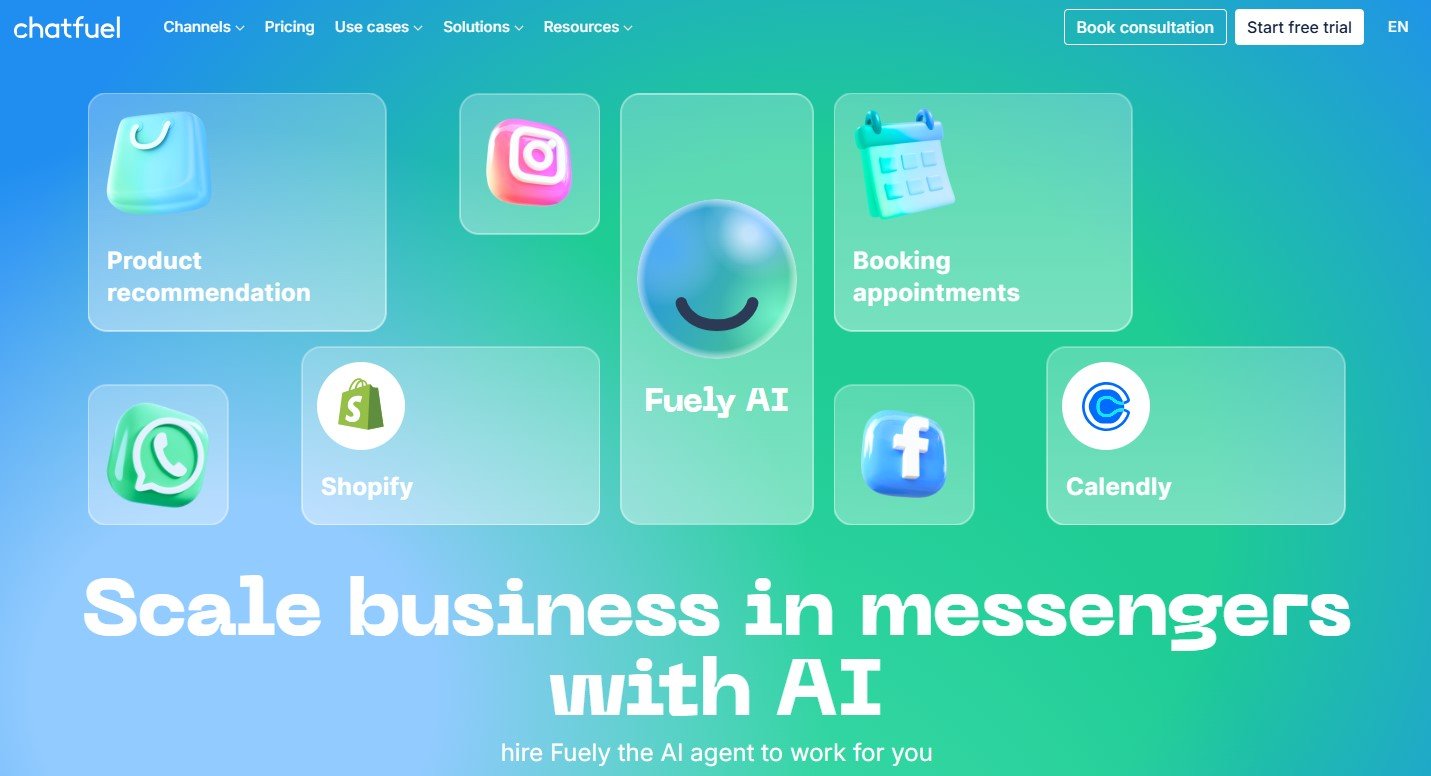
- . ManyChat specializes in automating conversations on Facebook Messenger and Instagram, making it ideal for businesses with a strong social media presence. It offers seamless integration with ecommerce platforms like Shopify, enabling automated order updates, support, and marketing campaigns. ManyChat’s intuitive interface and extensive template library allow businesses to quickly deploy chatbots tailored to their specific needs, enhancing engagement and driving sales.
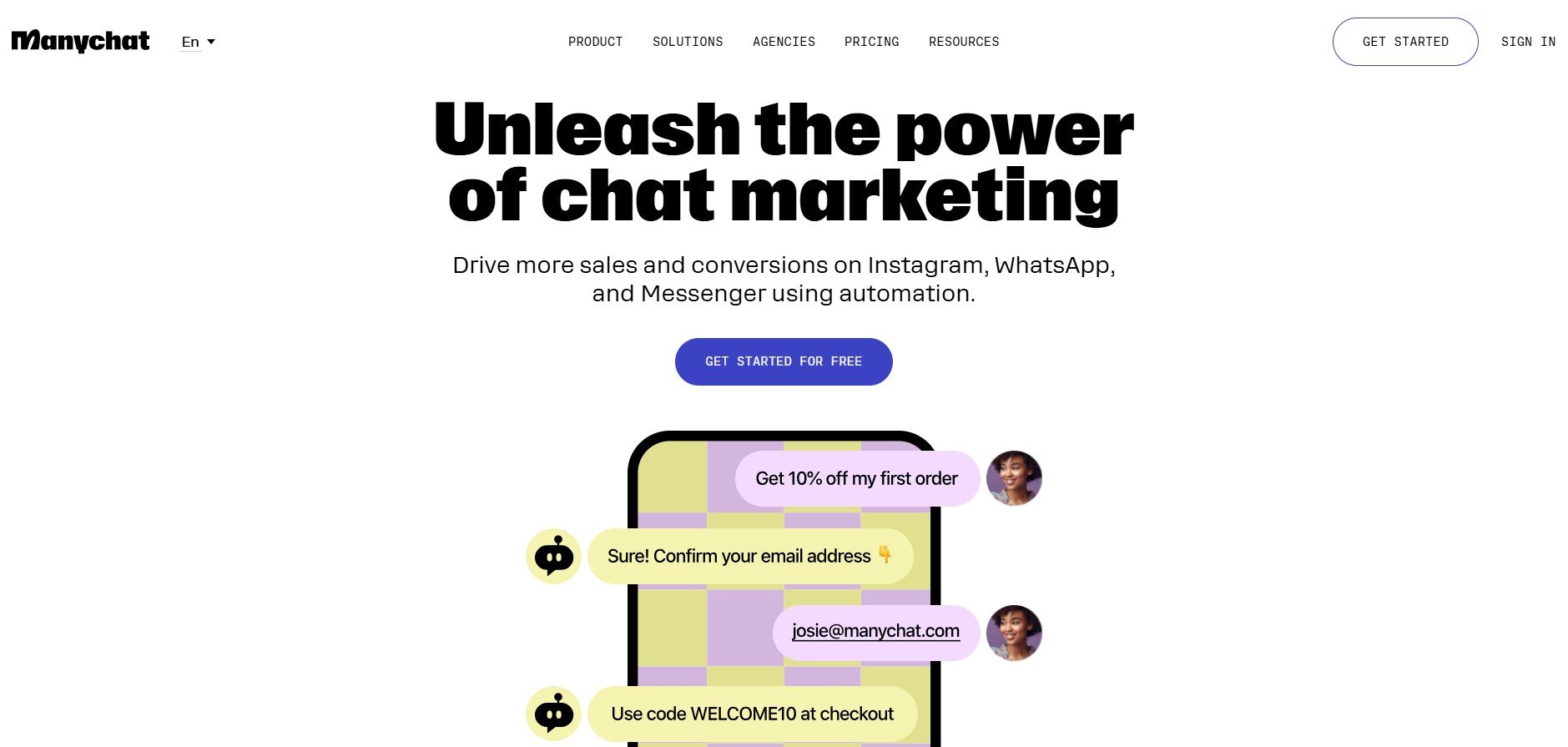
When choosing the best chatbot for ecommerce platforms, it’s essential to consider factors such as integration capabilities, scalability, and the specific functionalities that align with your business objectives. By leveraging these universal AI chatbot solutions, businesses can automate customer support, enhance user experiences, and streamline operations across multiple platforms.
Best AI Chatbots for Specific eCommerce Platforms
Below is a breakdown of top AI chatbot solutions tailored for major ecommerce platforms:
AI Chatbots for Magento eCommerce

Mirasvit GPT Chatbot for Magento 2
Magento’s flexibility and power make it one of the most popular platforms for ecommerce businesses. Its extensive customization capabilities require equally adaptable AI chatbot solutions to maximize customer engagement and streamline operations. Below, you will find the top AI chatbots designed to integrate seamlessly with Magento, offering a range of features from automated support to advanced personalization.
- Mirasvit GPT Chatbot. Mirasvit’s GPT Chatbot uses the power of GPT-4 to deliver exceptional 24/7 support. It enhances customer engagement by providing personalized responses, handling inquiries, and upselling products. Seamlessly integrated with Magento, this chatbot makes it easy to access product catalogs and customer data for targeted interactions. With a user-friendly interface and advanced analytics, it’s designed to meet the needs of businesses of all sizes.
- Webkul ChatGPT Virtual Assistant for Magento
The Webkul ChatGPT Virtual Assistant transforms customer interactions with its AI-driven conversational capabilities powered by ChatGPT. Seamlessly integrating with Magento 2, this virtual assistant enhances user experience by answering queries, offering product recommendations, and providing detailed information about your store. Its natural language processing (NLP) capabilities enable it to understand customer intent, making interactions feel natural and personalized. This chatbot is effective for automating repetitive support tasks, ensuring consistent and efficient customer service.
AI Chatbots for Shopify eCommerce
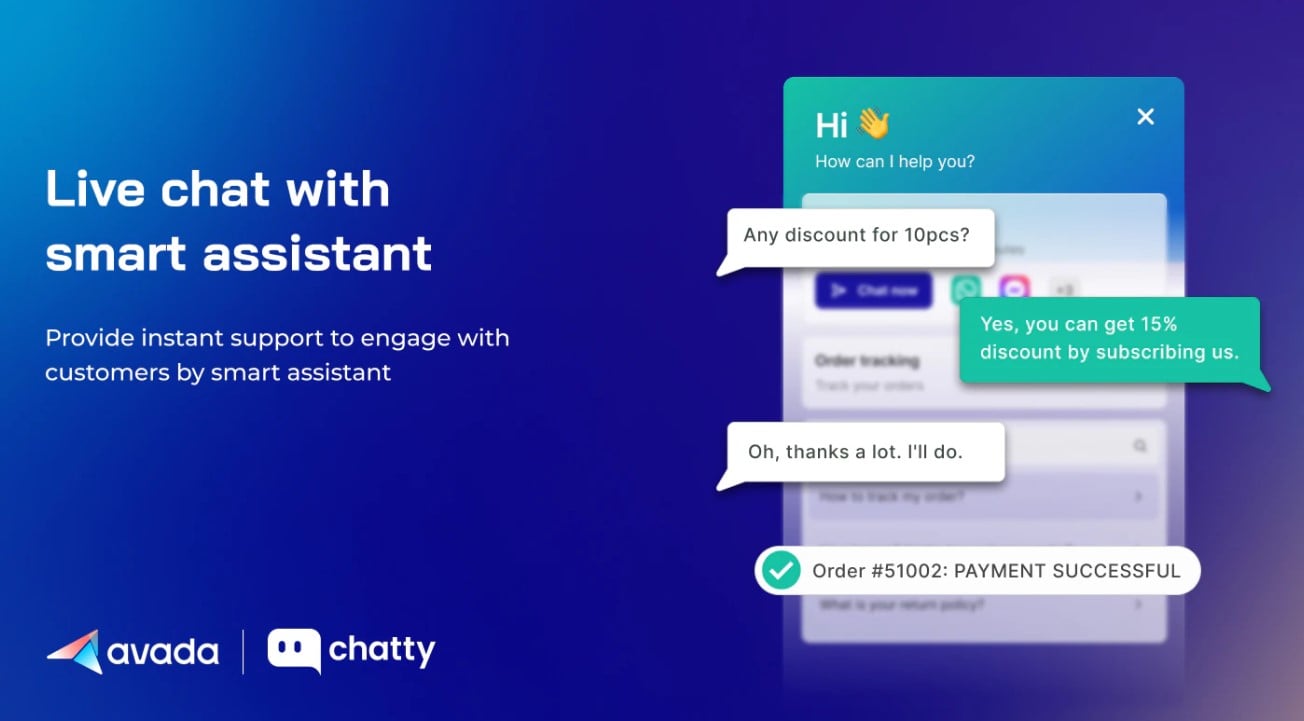
All-in-one Support Solution for Shopify Chatty
Shopify’s intuitive platform has become the go-to choice for many online businesses. To enhance its functionality, Shopify integrates with a variety of cross-platform AI chatbots and native solutions that provide advanced customer interactions and streamline backend processes. Here are the best chatbot solutions to supercharge your Shopify store:
- Chatty. Chatty is an all-in-one support solution designed to enhance Shopify stores. It offers live chat powered by an AI chatbot (ChatGPT v4), enabling instant responses to inquiries and fostering stronger relationships. Additionally, Chatty allows merchants to build a comprehensive FAQ hub for quick customer support and provides order-tracking features. The customizable chat widget can be tailored to match your brand and supports multiple contact methods, including WhatsApp, Facebook Messenger, Email, and Inbox. With the Chatty mobile app, you can even manage all conversations on the go.
- Willdesk. Willdesk is an AI-powered support and marketing platform that integrates seamlessly with Shopify. It combines order tracking, an FAQ page, a help center, a help desk, email, live chat, an AI chatbot, and social media messaging into one platform. This comprehensive tool allows businesses to manage support tickets from multiple channels, including Messenger, Instagram, and WhatsApp, all in one place. Willdesk also offers a branded self-service widget that integrates order tracking, FAQs, and a contact form, enhancing the customer experience. Its mobile app ensures you can respond to customers anytime, anywhere.
AI Chatbots for Shopware eCommerce
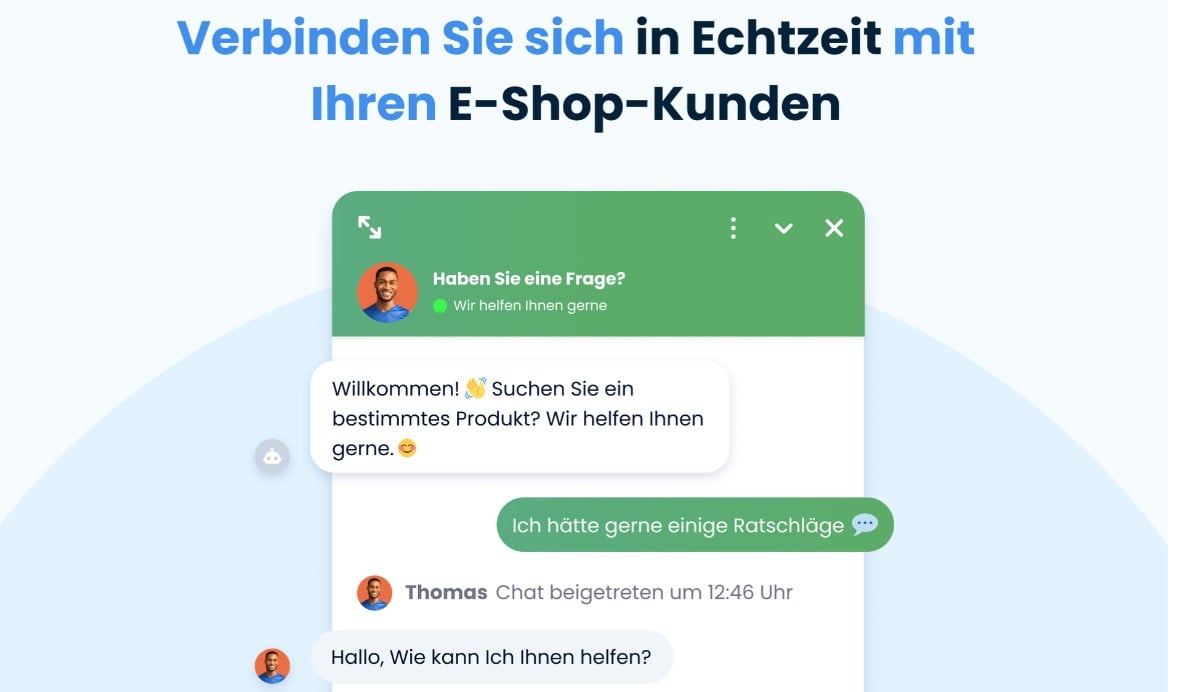
AI Chatbot for Shopware Smartsupp
Shopware’s emphasis on customization and scalability makes it ideal for businesses looking for flexible ecommerce solutions. To enhance its capabilities, these AI chatbots integrate seamlessly with Shopware, delivering automated support and personalized customer experiences.
- Smartsupp. Smartsupp is an online shopping assistant that combines live chat and chatbots to enhance engagement and boost sales. Designed for Shopware, it allows businesses to interact with online store visitors in real time, providing immediate support and personalized experiences. The chatbot component is tailored to save time by answering inquiries, directing visitors to suitable products, and maintaining conversations even during off-hours. Additionally, Smartsupp offers AI tools to streamline the customization of responses, making it a comprehensive solution for improving customer service and driving conversions.
- Contact to AI Chatbot Support. The “Contact to AI Chatbot Support” plugin seamlessly integrates with your Shopware contact form, utilizing artificial intelligence to address customer inquiries promptly. This integration enhances support by providing immediate, AI-driven responses, reducing response times, and improving overall customer satisfaction. The plugin is designed for easy setup, allowing businesses to implement AI chatbot support without extensive technical knowledge. Automating responses to common queries enables support teams to focus on more complex issues, thereby optimizing operational efficiency.
AI Chatbots for BigCommerce eCommerce

AI Chatbot for BigCommerce Maisie
BigCommerce is renowned for its scalability and ease of use, making it a favorite among growing businesses. To further elevate customer experiences, these AI chatbots offer seamless integration with BigCommerce, combining automation with personalization.
- Maisie AI Chatbots + Live Chat + Quizzes for BigCommerce
Maisie is an AI-powered sales and customer service assistant designed to enhance BigCommerce stores. It offers powerful chat automation with customizable triggers, enabling 24/7 customer engagement across all stages of the buying journey. Maisie facilitates conversational product recommendations, interactive quizzes, and personalized interactions to increase conversion rates and average order values. Its intuitive visual chatbot builder allows for the quick creation and deployment of ecommerce chatbots without coding.
. - Ochatbot & Ometrics Tools for BigCommerce
Ochatbot is an AI chatbot solution tailored for ecommerce sales, support, surveys, and user engagement on BigCommerce platforms. It assists buyers in making purchases, handling support issues, and overcoming sales obstacles. Ochatbot engages customers by conducting surveys, gathering contact information, and providing insightful conversation reports. The installation is straightforward, with automatic import of all product SKUs during setup, facilitating seamless integration into your BigCommerce store.
Each ecommerce platform offers unique challenges and opportunities, and the AI chatbot solutions listed here are designed to maximize the potential of Magento, Shopify, Shopware, and BigCommerce. By integrating the right chatbot, businesses can automate support, deliver personalized experiences, and scale operations efficiently.
Final Words
AI chatbots have revolutionized how ecommerce businesses interact with customers, offering unparalleled efficiency, scalability, and personalization. Throughout this guide, we’ve explored how these intelligent tools integrate seamlessly with platforms like Magento, Shopify, Shopware, and BigCommerce, enhancing engagement while streamlining operations. From handling high volumes of queries to delivering personalized product recommendations, the best AI chatbot for ecommerce is no longer a luxury but a necessity for businesses aiming to stay competitive in an increasingly digital marketplace.
Looking ahead, the AI chatbot evolution in ecommerce promises even greater advancements. With improvements in natural language processing, machine learning, and deep learning, future chatbots will offer deeper personalization, more intuitive conversations, and enhanced capabilities for analyzing customer data. These innovations will further cement chatbots as a cornerstone of ecommerce success, enabling businesses to anticipate and exceed customer expectations.
By embracing the top AI chatbots for ecommerce, businesses can not only enhance their operations today but also position themselves at the forefront of tomorrow’s digital shopping experience. The future of ecommerce is conversational, and the right AI chatbot is your gateway to building meaningful, scalable, and profitable customer relationships.
FAQ
What is the AI chatbot?
An AI chatbot is a software application that uses artificial intelligence technologies like natural language processing (NLP) and machine learning to simulate human conversation. It interacts with users via text or voice, providing responses, answering queries, and assisting with tasks such as product recommendations or order tracking.
How do AI chatbots enhance ecommerce?
AI chatbots enhance ecommerce by improving customer engagement, automating customer service, and personalizing the shopping experience. They provide 24/7 support, handle multiple queries simultaneously, offer product recommendations, streamline the checkout process, and reduce cart abandonment rates, driving higher customer satisfaction and sales.
Is there a free AI chatbot?
Yes, there are free AI chatbot solutions available for ecommerce businesses. Many chatbot providers offer free plans with basic features, such as Tidio and Chatty. However, advanced functionalities like analytics, integrations, and customization may require paid subscriptions.
What’s the difference between AI and condition-based chatbots?
AI chatbots use artificial intelligence, natural language processing, and machine learning to understand context, learn from interactions, and provide dynamic, personalized responses. Condition-based chatbots, also known as rule-based chatbots, rely on predefined scripts and respond only to specific inputs, offering less flexibility and adaptability compared to AI-driven chatbots.
Can an AI chatbot for ecommerce replace a support team?
AI chatbots can handle many customer service tasks, such as answering FAQs, tracking orders, and providing product recommendations, which can reduce the workload on human support teams. However, they may not fully replace human agents, especially for complex or sensitive issues that require personal interaction and decision-making.









